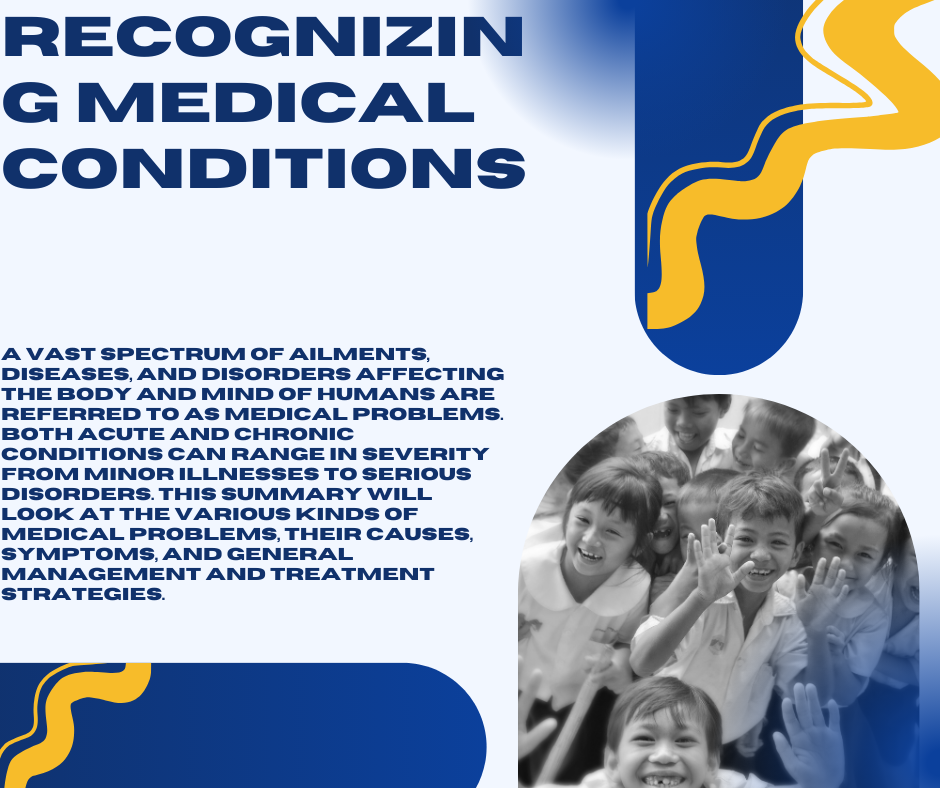A vast spectrum of ailments, diseases, and disorders affecting the body and mind of humans are referred to as medical problems. Both acute and chronic conditions can range in severity from minor illnesses to serious disorders. This summary will look at the various kinds of medical problems, their causes, symptoms, and general management and treatment strategies.
Recognizing Medical Conditions: A Synopsis
- Medical Condition Types
Diseases Caused by Infections:
-
-
- Bacterial infections: These infections, which are brought on by bacteria, can vary in severity from minor ailments like strep throat to serious ailments like sepsis and tuberculosis.
Viral Infections: COVID-19, HIV/AIDS, influenza, and the common cold are all illnesses brought on by viruses. These infections can have serious effects on public health and frequently spread quickly.
Fungal infections: Infections such as ringworm, athlete’s foot, and more serious ailments like systemic candidiasis can be brought on by fungi.
Parasitic Infections: Malaria, tapeworm infections, and lice infestations are among the illnesses that can be brought on by parasites such helminths, ectoparasites, and protozoa.
- Bacterial infections: These infections, which are brought on by bacteria, can vary in severity from minor ailments like strep throat to serious ailments like sepsis and tuberculosis.
-
- Prolonged Illnesses:
-
- Cardiovascular Diseases: These encompass ailments such as high blood pressure, heart failure, stroke, and coronary artery disease. They are frequently linked to lifestyle choices including smoking, exercise, and food.
Diabetes: Known for its high blood sugar levels, diabetes is a chronic illness that can cause major side effects like retinopathy, nephropathy, and neuropathy.
Chronic respiratory problems encompass asthma, lung cancer, and chronic obstructive pulmonary disease (COPD). Environmental factors like as smoking and pollution might worsen them, which can have a substantial impact on one’s quality of life.
Cancer: This broad category of disorders is defined by unchecked cell proliferation. Breast cancer, prostate cancer, lung cancer, and colorectal cancer are common forms.
- Cardiovascular Diseases: These encompass ailments such as high blood pressure, heart failure, stroke, and coronary artery disease. They are frequently linked to lifestyle choices including smoking, exercise, and food.
-
- Psychological Conditions:
-
- Depression: A depressive mental illness that results in enduring melancholy and interest loss. Physical symptoms are frequently present and might cause disruptions to day-to-day functioning.
Anxiety disorders encompass panic disorder, social anxiety disorder, and generalized anxiety disorder. Anxiety disorders can interfere with day-to-day tasks by producing excessive worry and fear.
Extreme mood swings, including manic and depressive episodes, are the hallmark of bipolar disorder. This illness has an impact on behavior, energy levels, and day-to-day functioning.
Schizophrenia: A serious mental illness affecting a person’s thoughts, feelings, and actions. Hallucinations, delusions, and decreased functionality may result from it.
- Depression: A depressive mental illness that results in enduring melancholy and interest loss. Physical symptoms are frequently present and might cause disruptions to day-to-day functioning.
-
- Autoimmune Conditions:
-
- Rheumatoid Arthritis: An autoimmune disease that mostly affects the joints, resulting in discomfort, edema, and rigidity.
Lupus: A systemic autoimmune illness with a wide range of symptoms that can impact the body’s organs and systems.
Muscle weakness, exhaustion, and cognitive problems are among the symptoms of multiple sclerosis, an inflammatory disease that affects the central nervous system.
- Rheumatoid Arthritis: An autoimmune disease that mostly affects the joints, resulting in discomfort, edema, and rigidity.
-
- Genetic Conditions:
-
- A hereditary condition called cystic fibrosis affects the digestive and respiratory systems, causing severe respiratory infections and trouble breaking down food.
Down syndrome is a genetic disorder that results in intellectual and developmental disabilities and is caused by an extra copy of chromosome 21.
A class of hereditary red blood cell diseases known as sickle cell disease cause the cells to stiffen and take on the appearance of a sickle, which can result in pain and other issues.
- A hereditary condition called cystic fibrosis affects the digestive and respiratory systems, causing severe respiratory infections and trouble breaking down food.
-
Reasons Behind Medical Disorders
There are many different types of medical problems, and they can be broadly divided into multiple groups:
-
-
- Genetic Factors: There is a genetic component to a lot of medical issues. Hereditary conditions such as Huntington’s disease, sickle cell anemia, and cystic fibrosis can result from mutations in particular genes.
Lifestyle Factors: Heart disease, diabetes, and several types of cancer are considerably increased by smoking, alcohol intake, exercise, and poor diet.
Environmental Factors: Conditions including cancer, infectious disorders, and asthma can all be influenced by exposure to chemicals, pollutants, and infectious agents. - Pathogens, including bacteria, viruses, fungi, and parasites, are responsible for a broad spectrum of infectious diseases.
Autoimmune Responses: Conditions such as lupus and rheumatoid arthritis are caused by the immune system of the body inadvertently attacking healthy tissues.
Mental Health Factors: Genetic susceptibility, stress, and trauma can all lead to the emergence of mental health conditions.
- Genetic Factors: There is a genetic component to a lot of medical issues. Hereditary conditions such as Huntington’s disease, sickle cell anemia, and cystic fibrosis can result from mutations in particular genes.
-
- Signs and Prognosis
-
- Depending on the particular disease or problem, medical disorders can have a wide range of symptoms. Pain, exhaustion, fever, coughing, dyspnea, and changes in appetite or weight are typical symptoms. Symptoms of mental health illnesses may include mood swings, anxiety, hallucinations, and cognitive decline.
- A patient’s medical history, physical examination, and diagnostic testing are usually used in conjunction to make a diagnosis. Blood tests, imaging investigations (such as MRIs, CT scans, or X-rays), biopsies, and genetic testing are a few examples of these examinations. Standardized questionnaires and psychological examinations are frequently used in the diagnosis of mental health disorders.
-
Handling and Medical Interventions
The kind and severity of a medical problem determine how it is managed and treated. Typical methods include of:
-
-
- Medications: Drugs can be used to treat infections, regulate chronic diseases, or manage symptoms. Examples include insulin for diabetes, antidepressants for mental health issues, and antibiotics for bacterial infections.
Lifestyle Modifications: The management of many chronic conditions can be greatly impacted by alterations to food, exercise, and behaviors (such as quitting smoking).
Surgery: Certain genetic abnormalities, cardiovascular disease, and cancer may require surgical procedures. - Therapies: Psychotherapy, occupational therapy, and physical therapy are crucial parts of the treatment of many ailments, particularly mental health and chronic illnesses.
Observing and Following Up: Managing chronic diseases and averting consequences requires routine condition monitoring through examinations and diagnostic testing.
- Medications: Drugs can be used to treat infections, regulate chronic diseases, or manage symptoms. Examples include insulin for diabetes, antidepressants for mental health issues, and antibiotics for bacterial infections.
-


